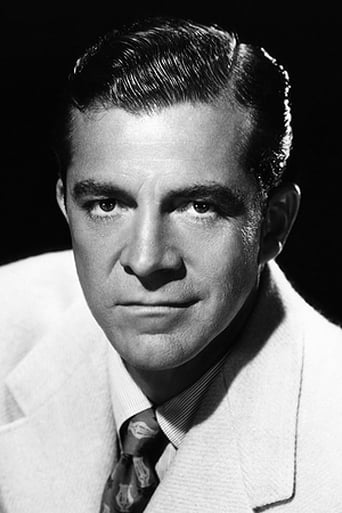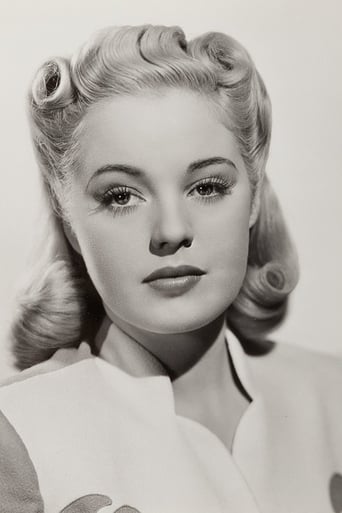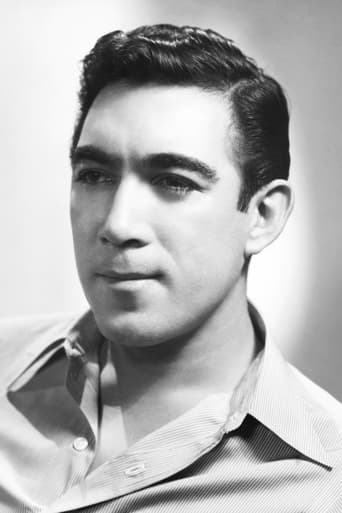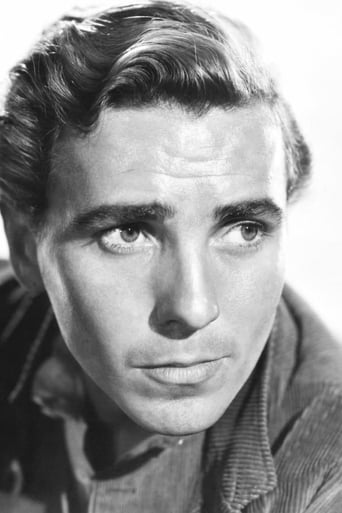Actuakers
One of my all time favorites.
Dotsthavesp
I wanted to but couldn't!
Derrick Gibbons
An old-fashioned movie made with new-fashioned finesse.
jimbo-53-186511
Drifters Gil Carter (Henry Fonda) and Art Croft (Henry Morgan) arrive back in Nevada (seemingly for Carter to pick up where he left off with an old flame only to discover that she has got married and left town). Carter & Croft soon learn that a farmer has been murdered and rather than bring the perpetrators in to face justice, the townsfolk take it upon themselves to dish out their own form of justice, but it seems that they are not entirely united on this matter...The Ox-Bow Incident is good as a concept and in many ways is probably ahead of its time. Thematically, it has, at the very least, probably proven to be influential on later film such as 12 Angry Men which focused on the notion of proving guilt rather than using suppositions or assumptions in order to reach a verdict. However, Hang Em High is probably a more recent film that shares much in common with the Ox-Bow Incident.Whilst its themes and ideology are worthy in themselves I sadly didn't find this film as compelling or involving as I hoped it would be. For a start, I found the narrative a little simplistic; everyone in the town is told that the farmer has been killed and they all believe it because someone told them that it's true?? I mean yes I can possibly believe it at a stretch, but with no real evidence it just seems a but dumb. Part of the plot has Carter coming back to meet his old flame and he does indeed bump into her later in the film, but what was the actual point of this meeting and what purpose did it have in the story??? Apart from giving Fonda the opportunity to practice his steely-eyed stare and give some more tough-talk I saw no real point to any of it. It's a waste of 5-10 minutes of screen time in my opinion, but given the film's short running time this only acts as a minor flaw.Once the bloodthirsty townsfolk catch up with our perpetrators then things do improve slightly; at this point we essentially get to the heart of the film here and some moral debating begins on how they should deal with these perpetrators. Whilst this in quite interesting, there's not really much depth injected into the script and you basically find a minority of people deciding that they want the perpetrators to face justice through the legal channels and others who want the perpetrators to face justice there and then. Unfortunately, it doesn't expand upon this and there isn't much input from the objectors or the bloodthirsty mob which for me would have added some weight to the film and made it slightly more satisfying.The acting is generally OK (although no-one really stood out for me) and at a shade over 70 minutes long it wouldn't take much time out of your life to watch this film, but given its high rating on IMDB I can't help but feel a little bit disappointed with what I got served up with here.
JohnHowardReid
Lynching - a peculiarly American phenomenon of mob violence. No less than 231 such acts were recorded in 1892. Even in 1943 three lynchings were reported) - had been dealt with in other films, most notably Fritz Lang's Fury (1936) and Mervyn LeRoy's They Won't Forget (1937). And it has been the theme of some notable films since, including Sound of Fury, Storm Warning, Riding Shotgun, Silver Lode and Intruder in the Dust. But none of these similar pictures take the uniquely objectivist view of The Ox-Bow Incident. It is a film with many villains, some familiar (the mischief-stirring town drunk, for instance, but played here with such powerful malevolence by Paul Hurst as to seem horribly original), some quite extraordinary by the prissy standards of 1942 Hollywood (particularly the loud-mouthed, lewd sadist given such vitality by Jane Darwell, of all people), ranged against twelve heroes - twelve good men and true.But examine these twelve men more closely. Three of them are the victims, powerless in their own defense: A feeble-minded, fearful old man (Francis Ford in one of his most convincing roles); a cocky but philosophically resigned Mexican (Anthony Quinn); and most importantly, an eloquently idealistic but extraordinarily stupid and impractical greenhorn living in a cloud-cuckoo land of mind-boggling naivety. It is one of the film's faults that neither as written nor played is this character sympathetic or believable. He is too stupid for credibility. We assume that it is all an act, that he will turn out to be the cunning bushwacker the villains suppose him to be. No doubt this is intentional - the director seizes upon the actor's immaturity and weaknesses to fill out the character - but it doesn't work, because we feel so little sympathy for him.Point one for curious objectivity. Point two is the fact that two of the good guys are away and arrive too late on the scene to prevent the tragedy. That makes The Ox-Bow Incident really unique.Point three are the seven men left: A well-intentioned but patronized Negro (played with a simple if "yes, massah" dignity by Leigh Whipper); a reluctant-to-be-involved cowhand (Fonda) and his even less willing buddy (Morgan); a weak, impotently defiant mother's boy (Eythe); two characters so minor they don't matter; and finally, a garrulous, whining old man (cleverly pitched by Harry Davenport to antagonize or irritate any audience).This indeed is a remarkable assembly of uniquely unsympathetic characters. But there are more: A heroine (Mary Beth Hughes) who has reneged on her promise to marry the cowhand and has instead hitched herself to a sneering, supercilious San Franciscan (Meeker); a pompous windbag of a judge (Briggs); his frosty housekeeper (Margaret Hamilton).We could go on. Remember these are the "good" people. We have scarcely mentioned the other side, led by Frank Conroy's fanatic old Confederate, and including Paul E. Burns in a rare, unsympathetic role as a rope-wielding lyncher and impressively-visaged Rondo Hatton who has no dialogue but can be glimpsed at the back of several scenes.Yes, The Ox-Bow Incident is unique. An uncompromisingly dark film with no conventional heroes or romance. Yet, despite its defiance of all the conventions, its powerful message succeeds in coming across.This success of course is no accident, but is the result of a tight unified script being convincingly played, set and directed, being atmospherically photographed and scored. True, Ox-Bow is no towering masterpiece of filmcraft - the film's limited budget has seen to that: The few actual location exteriors (including a memorable image of the hard-riding posse with Sparks trailing behind and gradually becoming enveloped in their dust) make an unwelcome contrast with obvious studio sets. The direction is inclined to be too stylish with the characters arranged in toe-the-line tableaux (an impression reinforced whenever Frank Conroy is on-screen, he stands so stiffly. Admittedly, this is certainly in character). However, these are minor defects, which do little or nothing to detract from the overall somber mood. Even the comedy is sad. And Mockridge's score with its plaintive "Red River Valley" played by a lonely concertina over the paralleled opening and closing shots is a memorable finishing touch.A courageous film, a unique film, a powerfully engrossing film, a film years ahead of its time, a film with a soberingly realistic atmosphere. The Ox-Bow is the real West. Even a much-touted realistic film like Cowboy (1958) is glossily romanticized. You'd have to go back to the silent days for similarly realistic atmosphere - particularly to Hell's Hinges (1919) directed by and starring William S. Hart.
weezeralfalfa
While its point is well taken that hot-headed vigilante justice is a more risky, if quicker and cheaper, form of justice than that achieved by jury trials, the screenplay has some significant problems, as reviewer edalweker, for example, pointed out:.....How did the false rumor that Kinkaid had been shot dead originate? This was the main reason for hanging the suspects. Certainly, the vigilantes(unofficial posse) should have checked to make sure this rumor was correct before they went out gunning for the perpetrator! The fact that one of the 3 suspects had a gun with Kincaid's name on it strongly suggested that he was killed and that the suspect, who claimed he "found" the gun, in fact had taken the gun from near Kinkaid's body. Since it turned out that Kincaid didn't die(was he wounded?), it's mighty mysterious that this suspect happened to 'find' his gun. If Kinkaid was badly wounded,"finding" his gun would be more understandable........The vigilantes had been told that some of Kinkaid's cattle had been stolen last night. A herd of Kinkaid's cattle was found near these strangers. Suspect Martin(Dana Andrews) claimed that they had bought them from Kinkaid yesterday, but hadn't been given a bill of sale. Mighty suspicious sounding!.....Thus, the vigilantes had seemingly strong suggestive evidence that these 3 had both killed Kinkaid and stolen his cattle. But, they hadn't checked out the truth of these rumors. It turned out that some of Kincaid's cattle had indeed been rustled, soon after the 3 bought their cattle, and that the rustlers had been caught, Thus, the unlikely claim that the suspects had bought the cattle without receiving a bill of sale, apparently was true. Otherwise, they might be a second group of rustlers! .......
Although many cases of lynchings involve little or no strong circumstantial evidence, this example purports to demonstrate that even multiple pieces of circumstantial evidence together can be misleading. Thus, an assumption of guilt should not be made without a thorough investigation......Of course, vigilante justice is more likely to be common where the judicial system is weak or corrupt, or too expensive and cumbersome. It was not obvious that any of these were true of this case, except that the sheriff happened to be away when these incidents supposedly happened, creating a temporary legal power vacuum......Is vigilante justice ever justified under the above conditions? I think so, but the participants should be held legally liable if they are proved wrong, and probably will be prosecuted even if they are right, if they can be identified.......I have an additional minor gripe. The character Rose Mapen should have been deleted, as she was only briefly present, and added nothing to the flow of the film. However, it was OK to mention her as the reason for Gil and Art coming to this small town, then being told she had left for San Francisco. See it at YouTube, at present.
SnoopyStyle
It's 1885 Nevada. Gil Carter (Henry Fonda) rides into town with Art Croft (Harry Morgan) looking for Rose Mapen (Mary Beth Hughes) who is now married. Rancher Larry Kinkaid has been murdered and a posses is organized to hunt down the cattle rustlers. Gil and Art join to avoid the wrath of the posse. The sheriff is away and the judge tells the men that a posse formed by a deputy is illegal. Major Tetley and his son Gerald lead the posse to three men assumed to be the rustlers. On the way, they run across Rose Mapen and her new husband. The posse captures Donald Martin (Dana Andrews), Juan Martínez (Anthony Quinn) and Alva Hardwicke (Francis Ford) who claim to be innocent. They supposedly purchased the cattle but nobody believes them.The start is a little slow. A less-than-heroic Henry Fonda is a little off-putting. Once the posse is organized, the movie gets going. The section with the three suspects is fantastic. It gets intense. The question about the men's guilt is truly compelling. The last act gets a little preachy and repetitive. The movie could have ended more dramatically with the simple reveal. Nevertheless, this is a classic with an amazing middle.





